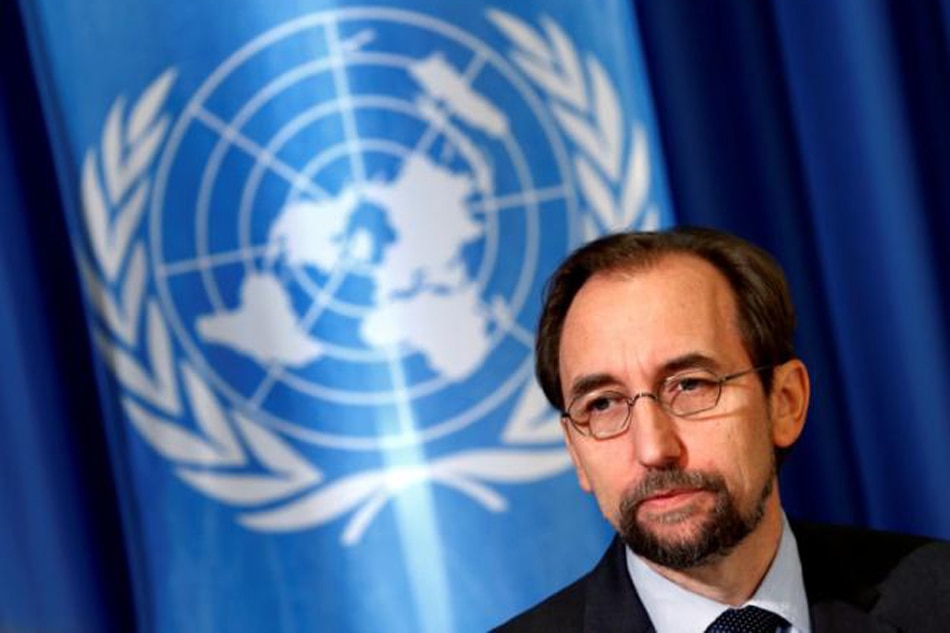编译:观察者网 徐乾昂
针对“禁毒战争”,国际社会近日向菲律宾出招。总统杜特尔特上周还放出“抓我仍需100万年”的豪言,今天(14日),他就宣布 “菲律宾将撤出《国际刑事法庭罗马规约》”。
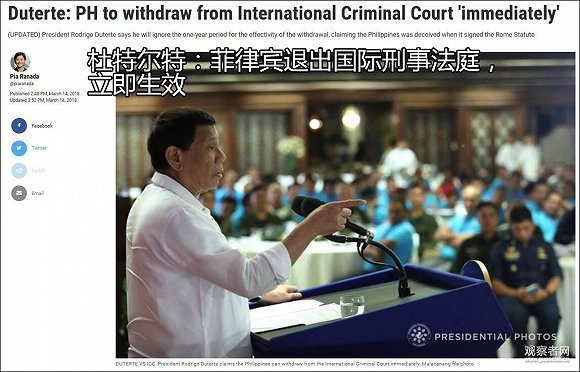
据菲律宾Rappler新闻网14日消息,杜特尔特以书面形式向外界告知:“作为菲律宾总统,我现在决定,菲律宾将撤出《国际刑事法庭罗马规约》,并立即生效。”究其原因,路透社表示,这是菲律宾受到联合国、国际刑事法庭的双重压力导致。
作为国际刑事法庭的条约基础,《罗马规约》规定,一国必须以书面形式向联合国秘书长申请,需要等1年才能解除缔约,而并不是所谓“立即生效”。对此,杜特尔特解释道:1年时限不适用于菲律宾,因为当初菲律宾在成为国际刑事法庭成员国时“存在程序上的漏洞”。
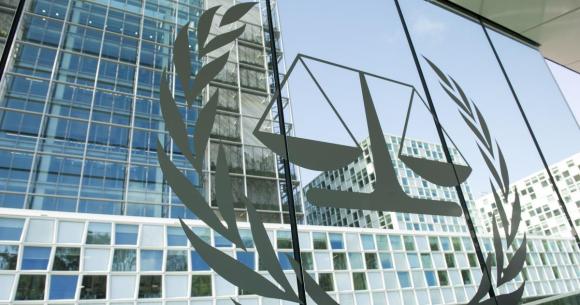
前总统阿基诺三世于2011年签署、并批准了《罗马规约》,宣布菲律宾接受国际刑事法院的管辖。杜特尔特口中的“漏洞”,则是“该国际法并未获得菲律宾本土法律的认可”。
《菲律宾民典法(Civil Code)》第二条规定,任何法律要在菲律宾本土生效,必须要在官方公报(Official Gazette)或报纸上刊登示众15天。而《罗马规约》,并没有在官方公报上刊登。
此外路透社称,国际刑事法庭只有在“目标国司法体系奔溃”的情况下才有权介入。杜特尔特表示“我国的司法体系健全完好”。
从上任以来,杜特尔特的“禁毒战争”出现多次争议,西方社会因此指责菲律宾总统有涉嫌“违反人道罪”等嫌疑。在多次呼吁下,国际社会在近日开启了对菲律宾的“围攻”。
先是国际刑事法庭在2月8日宣布启动对菲律宾的“预先检查(preliminary examination)”;然后是在上周,联合国人权特别调查员卡拉玛德(Agnes Callamard)称要赶赴菲律宾“实地考察”。
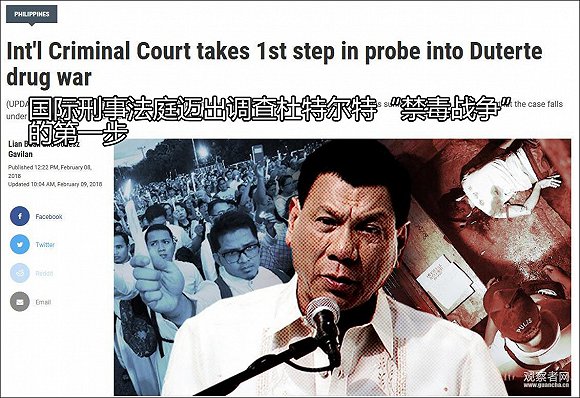
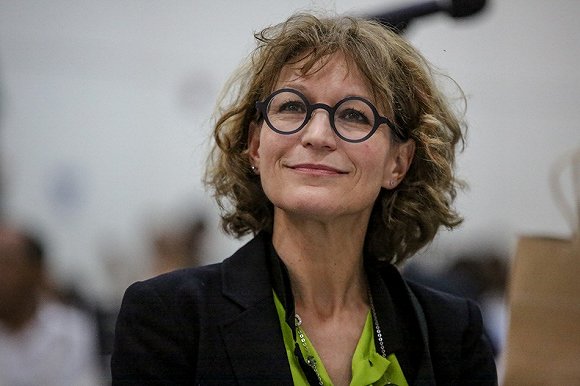
面对国际社会步步逼近,此前还表示“为救国愿把牢底坐穿”、“如果有罪就直接把我枪毙”的杜特尔特,如今态度开始转变——他不仅要“扇卡拉马德的耳光”,还要将她“扔去喂鳄鱼”。
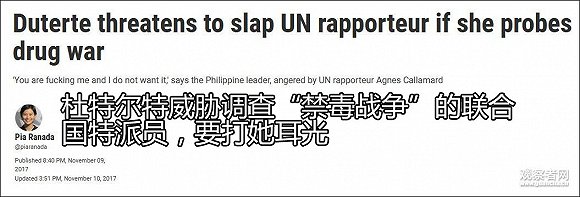
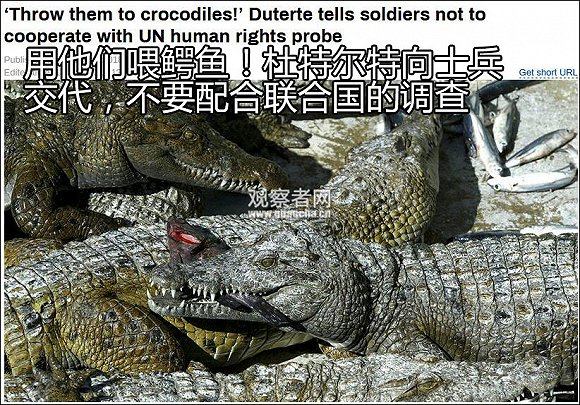
一周前,面对有关“会不会去国际刑事法院受审”的问题,杜特尔特在深夜“非常自信”地称,国际社会的调查将会止步于“初期检查”。而一周后,菲律宾宣布退出国际刑事法院。路透社对此解释,这是菲律宾受到联合国、国际刑事法庭的双重压力导致。
然而,早在2016年11月,上任菲律宾总统不久的杜特尔特,就已经透露出“退意”。在那一年的《罗马规约》缔约国第15次会议开幕之际,俄罗斯突然在11月16日宣布退出国际刑事法院(ICC)。一天后,杜特尔特表示,“我们可以效仿俄罗斯”。
国际刑事法院是一个基于《罗马规约》成立的独立机构。该规约于1998年在意大利罗马获得通过并于2002年生效,目前有109年个缔约国,另外39个国家已签署、但尚未批准这项规约。
2002年,美国和以色列取消了对罗马规约的签署,宣布不再承担相应法律义务。来源:观察者网
Rodrigo Duterte to pull Philippines out of international criminal court
Hannah Ellis-Petersen South-east Asia Correspondent Wed 14 Mar 2018 13.17 GMT
Rodrigo Duterte is to withdraw the Philippines from the international criminal court after it opened a crimes against humanity investigation into his brutal war on drugs.
In a lengthy statement, the Philippines president accused the ICC and the UN of a crusade against him, denouncing what he described as “baseless, unprecedented and outrageous attacks on my person”.
“I therefore declare and forthwith give notice, as president of the republic of the Philippines, that the Philippines is withdrawing its ratification of the Rome statute [the treaty that established the ICC] effective immediately,” said Duterte.
The ICC announced last month it was investigating allegations that Duterte had committed crimes against humanity in his war on drugs, which has killed an estimated 8,000 people since he took office in May 2016.
Duterte initially said he welcomed the chance to defend his name. But on Wednesday he said the ICC had shown a “brazen ignorance of the law” and claimed that the Rome statute was fraudulently implemented in the Philippines to begin with and therefore not “effective or enforceable”.
Philippine politicians met the announcement with scorn and anger. Congressman Antonio Tino said the move was “utterly self-serving and driven by sheer panic at the prospect of a trial before the ICC for crimes against humanity related to his murderous war on drugs”. Tino added: “Saving his own skin has taken precedence over the long-term commitment made by the Philippines state to human rights.”
Kabataan party representative Sarah Elago said it showed that “Duterte intends to impose his fascist and tyrannical tendencies even against international critics”.
“Only the guilty become too eager to run away from prosecution,” Elago added. “If indeed he wants to prove his innocence, what better platform than a court?”
Relations between the Philippines and the international community have become increasingly antagonistic in recent weeks. Last week, the department of justiceincluded a UN special rapporteur on a list of people declared to be communist terrorists. In response, the UN high commissioner for human rights, Zeid Ra’ad Al Hussein, said Duterte “needs to submit himself to some sort of psychiatric examination”.
In his statement on Monday, Duterte said Hussein’s comments were clear evidence of “international bias” and that the ICC was “being utilised as a political tool against the Philippines”.
He also described the ICC’s inquiry – which involves looking into a 77-page report submitted to it last year that allegedly documents Duterte’s crimes against humanity going back to 1988 when he was mayor of Davao – as “unduly and maliciously created”.
When the Philippines ratified the Rome statute in 2011 – nine years after it came into force – it was seen as a big step forward for human rights in Asia. The country’s withdrawal will be seen as a blow for international accountability in the region. The ICC, based in The Hague, is the world’s only permanent international tribunal that looks into war crimes and crimes against humanity.
Duterte has made his contempt for the ICC well-known in the past, calling it “bullshit”, “hypocritical” and “useless”, but in his statement on Wednesday, he went further, accusing the court of violating its own due process and depriving him of the right of innocence until proven guilty.
Should the ICC’s preliminary inquiries find evidence of crimes against humanity, the Philippines’ sudden withdrawal from the statute would not protect Duterte from being put on trial. A country’s withdrawal from the ICC takes effect a year after the UN has received the application and article 127 of the Rome statute specifies that “withdrawal shall not affect any cooperation with the court in connection with criminal investigations”.
James Gomez, Amnesty International’s south-east Asia director, described Duterte’s move as misguided and deeply regrettable. “Powerful individuals in the Philippines are more interested in covering up their own potential accountability for killings than they are in ensuring justice for the many victims of the country’s brutal war on drugs’,” Gomez said.
There are 139 countries signed up to the Rome statute, but with some powerful exceptions. The US signed the treaty in 2000 but never ratified it, citing concerns over sovereignty, similarly with Russia. Israel signed it for a short period but also never ratified it into law.
Should the UN accept Duterte’s withdrawal, it would make the Philippines only the second country to withdraw from the Rome statute, following Burundi in 2017. South Africa attempted to leave in 2016, but its withdrawal was revoked by the UN.






